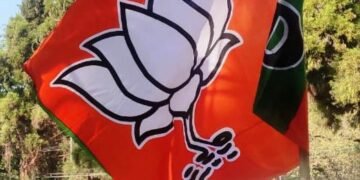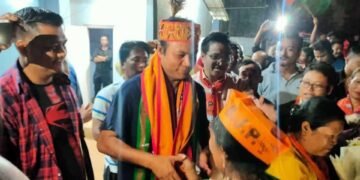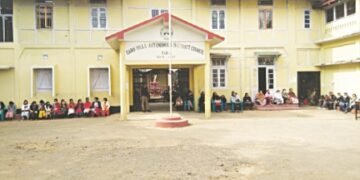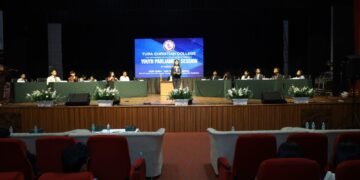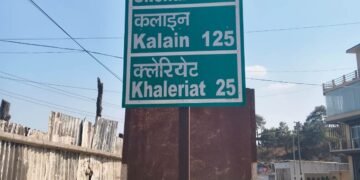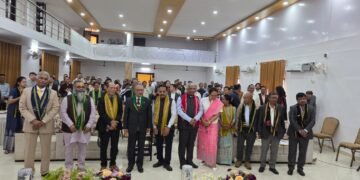While numerous Indian experts may naturally analyse Bangladesh’s election outcome through the lens of Indian interests, deeming Sheikh Hasina’s Awami League victory as favourable for India, it’s essential to broaden the perspective. Rather than a myopic focus on India’s benefit, the crucial inquiry should revolve around the impact on the people of Bangladesh. Evidently, the Awami League’s consecutive fourth victory is considered advantageous for Bangladesh, primarily due to the commendable economic growth experienced under the party’s governance. The perception of the BNP aligns it with supporting Islamism, a stance that not only poses challenges for Hindu and Buddhist minorities but also raises concerns for Muslims within the country.
Despite economists indicating strong performance in the Bangladesh economy until 2019, recent years, especially 2023, have posed significant challenges. However, attributing the entirety of this one-sided election’s story to economic factors alone would be an oversimplification. There’s speculation that the main Opposition party, the Bangladesh Nationalist Party (BNP), might have hesitated about its chances of winning, leading to a strategic decision to ‘concede’ defeat. The BNP’s decision to boycott, coupled with a low voter turnout of around 40 per cent, as reported by Bangladesh’s The Daily Star, underscores a substantial deficit in the democratic process that cannot be overlooked.
In the realm of democracy and elections, the adage “justice should not only be done but also seen to have been done” holds true. Maintaining credibility is paramount, and an election devoid of robust competition raises uneasy inquiries. Speculations suggest that Hasina endeavoured to ensure a fair election by distributing seats to parties like Jatiya Party. Attempts were also made to negotiate a similar compromise with the BNP, but these efforts ultimately proved unsuccessful.
While the Awami League is expected to refute these allegations, Bangladesh observers have voiced their disappointment regarding the electoral process. The issue of low voter turnout, a common occurrence in democracies globally, persists even in those considered mature. The alarming aspect in Bangladesh is the pervasive sense among observers of democracy showing signs of unhealthiness. Independent election observer Sharmeen Murshid, as quoted in The Daily Star, expressed, “This was an election without grammar… I did not see an election….It didn’t fit into anything… results were the same.”
Accusations against Hasina and the Awami League government revolve around claims of authoritarianism, accompanied by allegations of favoritism and corruption. While such charges may be anticipated for any long-standing administration, their veracity is not assured. It remains undeniable, however, that parties and leaders unopposed by a credible challenge often exhibit authoritarian tendencies due to the absence of democratic checks from a robust Opposition. Rationalising this drift towards authoritarianism proves challenging, and its adverse impact on the political landscape cannot be easily dismissed. The victorious Awami League and Hasina now confront the daunting task of addressing the people’s disappointment and simmering discontent, which might find expression in protests. The intensity of public anger is likely to escalate with increased repression.
In the journey of surviving democracies, internal adjustments are inevitable, and the people’s resilience is bound to surface sooner or later. Crucial inquiries arise concerning the fairness of the Sunday election under the prevailing circumstances and whether the Hasina government has eroded democratic institutions and processes. Additionally, the significance of the low voter turnout in reflecting public disillusionment with the Awami League cannot be overlooked. These questions hold relevance for Bangladesh and its citizens. External observers may prioritise economic and strategic benefits over the nature of the regime. India and China, for instance, would be keen on assessing if the Dhaka government amplifies their influence and brings about economic and strategic advantages. Meanwhile, the people of Bangladesh aspire to an improved quality of life, encompassing enhanced democratic governance.
One could contend that the Awami League and Hasina are not to blame for being the sole contenders in the political arena. Winning successive elections and adopting an authoritarian stance may not be inherently their fault. If democracies face challenges, it’s arguably not the political parties or leaders at fault, but rather the responsibility lies with the people. The populace bears the weight of accountability. While this may sound like a theoretical pondering, the caliber of democracy undeniably plays a pivotal role in shaping a country’s political and economic stability.
A pragmatic standpoint suggests that as long as the economy thrives, ensuring employment and averting starvation, the nature of the ruling party becomes secondary. The primary concern for neighboring countries and the global community should be economic instability within a nation. This instability often triggers migration, both to nearby and distant countries. From an Indian perspective, the argument is that a prosperous Bangladesh, even under an authoritarian regime, could be viewed favourably as it might contribute to curbing illegal migration.
The BNP’s role in Bangladesh politics adds another layer of complexity. Perceived as endorsing Islamism, the party’s stance not only poses challenges for Hindu and Buddhist minorities but also raises concerns for Muslims. The dilemma surfaces: is it more preferable to have the authoritarian Awami League in power than the religiously inclined BNP? This echoes the struggle faced by Egyptians, enduring an autocratic secular regime rather than a fervently Muslim Brotherhood-supported party. Navigating the right choice in a democratic setting is inherently challenging, laden with risks. It appears that Bangladeshis have opted to take the risk by re-electing the Awami League and Hasina.
(The writer can be reached at dipaknewslive@gmail.com)


